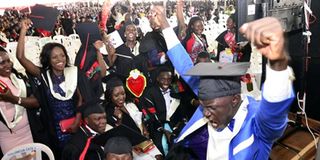Prime
Parliament rejects proposal to disband State House scholarships

Graduates celebrate during a graduation ceremony recently. The State House scholarship scheme has been in existence for more than a decade. FILE PHOTO
What you need to know:
- Critics now say the scheme has outlived its purpose and should have already been disbanded.
- On the chop board, however, was the inland travels, meals and allowances. The committee observed that logistical support to State House in form of travel inland, allowances and special meals have been considered consumptive and subjected to a 10 per cent budget cut, translating into nearly Shs79b.
KAMPALA. Parliament has disregarded the views of its Committee on Presidential Affairs that had proposed that State House gives up control of the Shs20 billion scholarship fund under its charge to the Higher Education Students Financing Board, and instead passed the budget unchanged.
The Higher Education Students’ Financing Board is a semi-autonomous government body mandated to provide financing for Higher Education in form of loans and scholarships.
After scrutinising the State House ministerial policy statement indicating the budgetary allocations for financial year 2017/18, the Committee on Presidential Affairs recommended that the State House Scholarship Fund be phased out and the Shs20 billion allocation be redirected towards the sponsorship of students under the Higher Education Students Financing Board.
“Pursuant to Section 42 of the Higher Education Students Financing Act, 2014, the committee therefore recommends that State House provides scholarship exit plan to be reflected in reducing allocation tending to zero in the medium term so that the Shs20 billion be redirected to the students loans scheme,” the committee report read.
Although the committee did not fault the intention of the State House Shs20 billion Scholarship Scheme which has been in existence for more than a decade and a half, members of the committee expressed concern over the opaque criteria of access and award of the scholarship.
This unclear criteria of access formed part of basis upon which the committee recommended the State House Scholarship Scheme be phased out in the medium term and have the Shs20 billion redirected to the loans scheme under Higher Education Students Financing Board where every Ugandan would have an equal opportunity to access.
The committee also argued that the government has put in place the Universal Primary Education and the Universal Secondary Education programmes, which all Ugandans should embrace.
The MPs on the committee also queried why the proposed financial year allocation was maintained at Shs20b, yet the number of beneficiaries has greatly reduced from more than 8,000 to only 3,720.
Although this scheme has been under State House for years, it was rebranded in 2013, this time attracting not less than Shs20b every financial year. The scheme was instituted to help poor students acquire higher education. Part of the deal was to have the beneficiaries refund the total sum spent on them after 12 months upon completing studies but this has not worked out as planned.
Critics now say the scheme has outlived its purpose and should have already been disbanded.
But when contacted on Thursday, the Senior Presidential Press Secretary, Mr Don Innocent Wanyama, said: “There is no more provision for the State House Scholarship Fund. That is now a matter that is being handled by the ministry of Education and not State House. And if the President decides to offer any sponsorship that will be catered for under the presidential donation budget.”
The committee recommended that for the sake of fighting poverty, more model villages should be rolled out in addition to the current 21, and okayed an allocation of Shs1 billion to State House instead of half a billion shillings that was being fronted.
On the chop board, however, was the inland travels, meals and allowances. The committee observed that logistical support to State House in form of travel inland, allowances and special meals have been considered consumptive and subjected to a 10 per cent budget cut, translating into nearly Shs79b.



